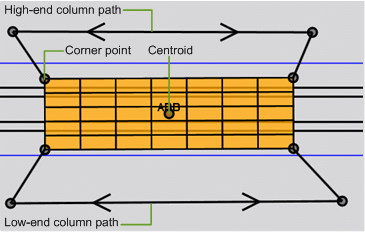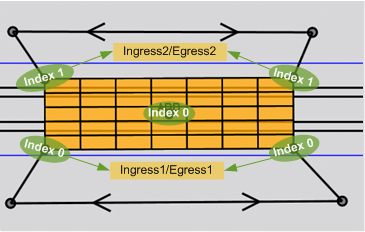
When you create a yard path, you must make sure to always create ingress1 and egress1 before you create ingress2 or egress2. This sequence ensures that N4 calculates distances accurately. Whether N4 creates ingress1/egress1 or ingress2/egress2 depends on the path index assigned, which in turn is tied to the way that you connect vertices to the stack block.
As shown in the following figure, each stack block has two column paths: one at the high end of the block and one at the low end of the block. In addition, each stack block has four corner points: bottom left, bottom right, top left, and top right. The high end and low end of a stack block are fixed, which means that when you rotate a stack block, the ends rotate as well.
Figure: Location of column paths, corner points, and centroid

How you connect the ingress and egress vertices to the stack block determines the index that N4 assigns to the path. Based on the path index, N4 then writes the block vertices to the yard file.
The path index is:
0 when you connect the ingress/egress vertex to the stack block's centroid, bottom left corner, or bottom right corner. Block vertices are ingress1 and egress1.
1 when you connect the ingress/egress vertex to the stack block's top right corner or top left corner. Block vertices are ingress2 and egress2.
Figure: Path indexes
